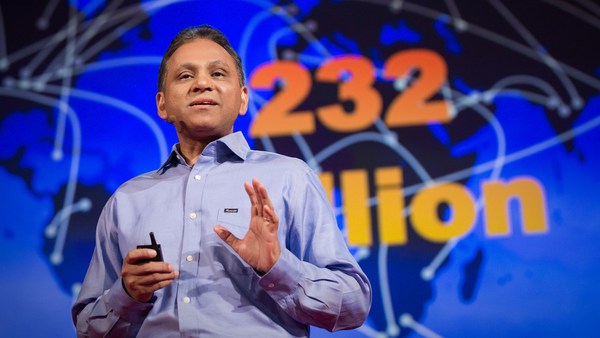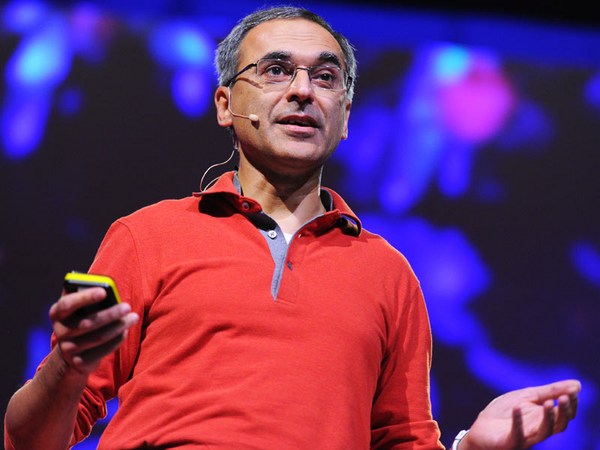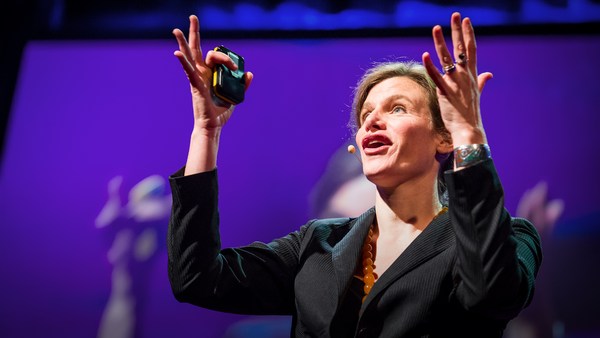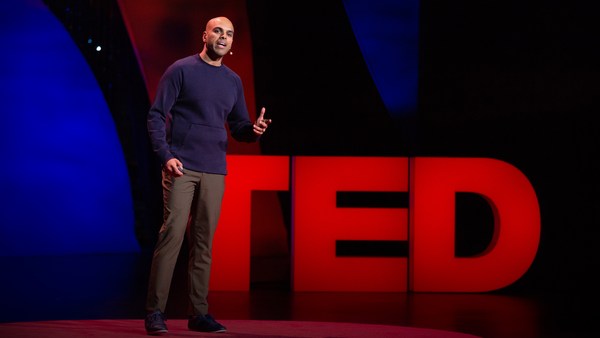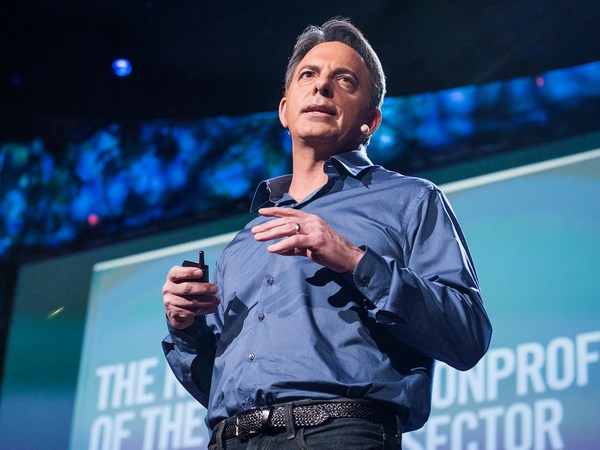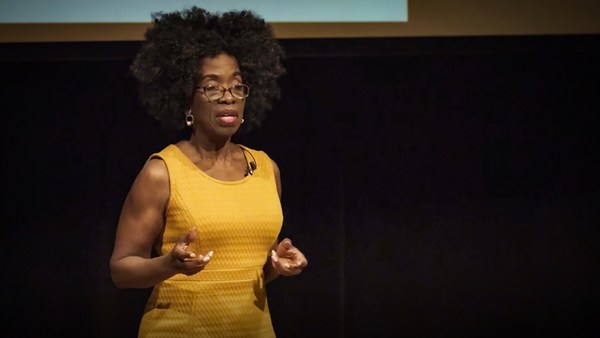I believe big institutions have unique potential to create change, and I believe that we as individuals have unique power to influence the direction that those institutions take.
Now, these beliefs did not come naturally to me, because trusting big institutions, not really part of my family legacy. My mother escaped North Korea when she was 10 years old. To do so, she had to elude every big institution in her life: repressive governments, occupying armies and even armed border patrols. Later, when she decided she wanted to emigrate to the United States, she had to defy an entire culture that said the girls would never be the best and brightest. Only because her name happens to sound like a boy's was she able to finagle her way into the government immigration exam to come to the United States.
Because of her bravery and passion, I've had all the opportunities that she never did, and that has made my story so different. Instead of running away from big institutions, I've actually run toward them. I've had the chance over the course of my career to work for The Wall Street Journal, the White House and now one of the largest financial institutions in the world, where I lead sustainable investing.
Now, these institutions are like tankers, and working inside of them, I've come to appreciate what large wakes they can leave, and I've become convinced that the institution of the global capital markets, the nearly 290 trillion dollars of stocks and bonds in the world, that that may be one of our most powerful forces for positive social change at our disposal, if we ask it to be.
Now, I know some of you are thinking, global capital markets, positive social change, not usually in the same sentence or even the same paragraph. I think many people think of the capital markets kind of like an ocean. It's a vast, impersonal, uncaring force of nature that is not affected by our wishes or desires. So the best that our little savings accounts or retirement accounts can do is to try to catch some waves in the good cycles and hope that we don't get inundated in the turbulent ones, but certainly our decisions on how to steer our little retirement accounts don't affect the tides, don't change the shape or size or direction of the waves.
But why is that? Because actually, one third of this ocean of capital actually belongs to individuals like us, and most of the rest of the capital markets is controlled by the institutions that get their power and authority and their capital from us, as members, participants, beneficiaries, shareholders or citizens. So if we are the ultimate owners of the capital markets, why aren't we able to make our voices heard? Why can't we make some waves?
So let me ask you a different question: did any of you buy fair trade coffee the last time you were at a supermarket or at Starbucks? OK. Do any of you go to the restaurant and order the sustainably farmed trout instead of the miso-glazed Chilean sea bass that you really wish you could have? Do any of you drive hybrid cars or even electric cars?
So why do we do these things? Right? One electric car doesn't amount to much in a fleet of 1.2 billion combustion engine vehicles. One fish is just one fish in the sea. And one cup of coffee doesn't amount to a hill of beans in this crazy world. But we do these things because we believe they matter, that our actions add up, that our choices might influence others and collectively, what an impact we can have.
So, in my bag I have a coffee mug that I bought a couple of years ago. It's a reusable mug. It has all these things printed on it. Look at some of the things that are on it, that it says.
"This one cup can be used again and again."
"This one cup may inspire others to use one too."
"This one cup helps save the planet." I had no idea this plastic cup was so powerful.
(Laughter)
So why do we think that our choice of a four dollar shade-grown fair trade artisanal cup of coffee in a reusable mug matters, but what we do with 4,000 dollars in our investment account for our IRA doesn't? Why can't we tell the supermarket and the capital markets that we care, that we care about fair labor standards, that we care about sustainable production methods and about healthy communities? Why aren't we voting with our investment dollars, but we would vote with our lattes?
So I think it has something to do with the myths, the fables that we all carry around in our collective consciousness. Do you remember the Grimm's fairy tale about the magic porridge pot? If you said to the pot, "Boil, little pot, boil," it would fill up with sweet porridge. And if you said, "Stop, little pot, stop," it would stop. But if you got the words wrong, it wouldn't listen, and things could go terribly awry. So I think when it comes to markets, we have a little bit of a similar fable in our heads. We believe that the markets is this magic pot that obeys only one command: make more money. Only those words said exactly that way will make the pot fill up with gold. Add in some extra words like "protect the environment," the spell might not work. Put in the wrong words like "promote social justice," and you might see your gold coins shrink or even vanish entirely, according to this fable.
So we asked people, what do you really think? And we actually went out and polled a thousand individual investors, and we found something fascinating. Overwhelmingly, people wanted to add those extra words into the formula. 71 percent of people said yes, they were interested in sustainable investing, which we define as taking the best in class investment process that you already have traditionally and adding in the extra information you get when you think about the environment and society and good governance. 71 percent wanted that. 72 percent said that they believe that companies who did that would actually do better financially. So people really do believe that you can do well by doing good. But here was the weird thing: 54 percent of the people still said if they put their money in those kinds of stocks, they thought that they would make less money.
So is it true? Do you get less sweet porridge if you invest in shade-grown coffee instead of drinking it? Well, you know, the investors in companies like Burt's Bees or Ben & Jerry's wouldn't say so. Right? Both of those started out as small, socially conscious companies that ended up becoming so popular with consumers that the giants Unilever and Clorox bought them for hundreds of millions of dollars each. But here's the important thing. Those corporations realized that if they wanted to protect the value of their investments, they had to preserve that socially conscious mission. If they didn't keep adding in those extra words of environmentally friendly and socially conscious, those brands wouldn't make more money.
But maybe this is just the exception the proves the rule, right? The serious companies that fund our economy and that fund our retirements and that really make the world go round, they need to stick to making more money. So, Harvard Business School actually researched this, and they found something fascinating. If you had invested a dollar 20 years ago in a portfolio of companies that focused narrowly on making more money quarter by quarter, that one dollar would have grown to 14 dollars and 46 cents. That's not bad until you consider that if instead you'd invested that same dollar in a portfolio of companies that focused on growing their business and on the most important environmental and social issues, that one dollar would have grown to 28 dollars and 36 cents. almost twice as much sweet porridge.
Now, let's be clear, they didn't make that outperformance by giving away money to seem like a nice corporate citizen. They did it by focusing on the things that matter to their business, like wasting less energy and water in their manufacturing processes; like making sure the CEO contracts had the CEOs incentivized for the long-term results of the company and the communities they served, not just quarterly results; or building a first class culture that would have higher employee loyalty, retention and productivity. Now, Harvard's not alone. Oxford also did a research study where they examined 120 different studies looking at the effect of sustainability and economic results, and they found time and time and time again that the companies that cared about these kinds of important things actually had better operational efficiency, lower cost of capital and better performance in their stock price.
And then there's Al Gore. So 20 years ago, when I worked for Al Gore in the White House, he was one of the early pioneers pleading with businesses and governments to pay attention to the challenges of climate change. Post-White House, he opened an investment firm called Generation, where he baked environmental sustainability and other things right into the core investment process. And at the time there was a good bit of skepticism about his views. Ten years later, his track record is one more proof point that sustainable investing done right can be sound investing. Far from making less sweet porridge because he added sustainability into the mix, he actually significantly outperformed the benchmark.
Now, sustainable investing, the good news is it doesn't require a magic spell and it doesn't require some investment secret, and it's not just for the elite. It is not just about private equity for billionaires. It's not just groovy-sounding investments like clean technology or microfinance in emerging markets or artisanal bakeries in Brooklyn. It's about stocks and bonds and Fortune 500 companies. It's about mutual funds. It's about all the things we already see in the market today.
So here's why I'm convinced that we collectively have the power to make sustainable investing the new normal.
First, the proof points are coming out all the time that sustainable investing done right, preserving all the same good principles of investing, the traditional sphere, can pay. It makes sense.
Secondly, the biggest obstacle standing in our way may actually just be in our heads. We just need to let go of that myth that if you add your values into your investment thinking, that you get less sweet porridge. And once you get rid of the fable, you can actually start appreciating those facts we've been talking about.
And third, the future is already here. Sustainable investment today is a 20 trillion dollar market and it's the fastest-growing segment of the investment industry. In the United States, it has grown enormously, as you can see. It now represents one out of every six dollars under professional management in the United States.
So what are we waiting for? For me, it goes back to the inspiration that I received from my mother. She knew that she wanted a life where she would have the freedom to make her own choices and to have her voice heard and write her own story. She was passionate about that goal and she was clear that she would let no army, no obstacle, no big institution stand in her way. She made it to the States, and she became a teacher, an award-winning author and a mother, and ended up sending her daughters to Harvard. And these days, you can tell that she is amply comfortable holding court in the most powerful institutions in the world. It seems almost too prophetic that her name in Korean means "passionate clarity."
Passionate clarity: that's what I think we need to drive change. Passion about the change we want to see in the world, and clarity that we are able to help chart the course. We have more opportunity today than ever before to make choices. We have more power than ever before to make our voices heard.
So change your perspective. Vote with your small change. Invest in the change you want to see in the world. Change the fables and change the markets.
Thank you.
(Applause)
